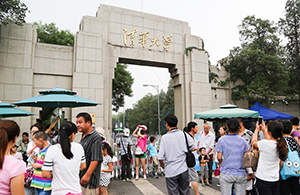Human Rights Watch in the wrong
(China Daily) Updated: 2016-04-27 07:14
 |
|
A 10-member Taiwan delegation led by Chen Wen-chi (center) visits on Thursday a house of detention in Beijing where 45 suspects from the island are held.[Photo/Xinhua] |
Human Rights Watch recently criticized Kenya's deportation to the Chinese mainland of 45 telecommunication fraud suspects from Taiwan and called for an end to what it said was the "illegal repatriation" of suspects to the mainland.
It remains unknown whether the New York-based organization realizes that Taiwan's judiciary recognized Kenya's repatriation of these fraud suspects to the mainland and it is mainly those "independence-minded" politicians and radical figures on the island that have made a fuss over the repatriation case.
Regardless of these facts, Human Rights Watch has shown its total disregard to the legal rights of the mainland's victims and the "territorial jurisdiction" principle of international law. By ignoring these and smearing the Chinese mainland, Human Rights Watch has proved it is speaking with the secessionist voices on the island.
The repatriation of telecommunication fraud suspects to the mainland is actually a simple transnational criminal case that should be free of political factors. It is totally lawful for the mainland's police to pursue and bring to justice those from the island who organize telecom frauds targeting mainland residents.
According to the logic of Human Rights Watch, the Chinese mainland should not have independent judicial power and should operate its judiciary only under the guidance of the West. China's judicial system does have problems in some areas, but the country has made continuous efforts for its improvement.
However, the consistent prejudice it displays toward China does reflect that Human Rights Watch totally repudiates the contribution China has made to the international human rights cause and its hostility to Beijing.
As a non-governmental organization funded by Western funds, the irresponsible remarks by Human Rights Watch about China usually remain unchecked by the West and indeed are encouraged.
--Global Times
- Taiwan wire fraud suspects to face trial on mainland
- Telecom fraud suspects to face proceeding on Chinese mainland
- China plans Credit Law to end fraud, consolidate tracking systems
- Joint efforts to fight wire fraud discussed
- Taiwan decision to free fraud suspects wrong
- Parties, media in Taiwan call for justice for fraud victims
- Taiwan police release 20 telecom fraud suspects deported from Malaysia
- Fraud suspects' return politicized
- 77 fraud suspects repatriated from Africa

I’ve lived in China for quite a considerable time including my graduate school years, travelled and worked in a few cities and still choose my destination taking into consideration the density of smog or PM2.5 particulate matter in the region.











